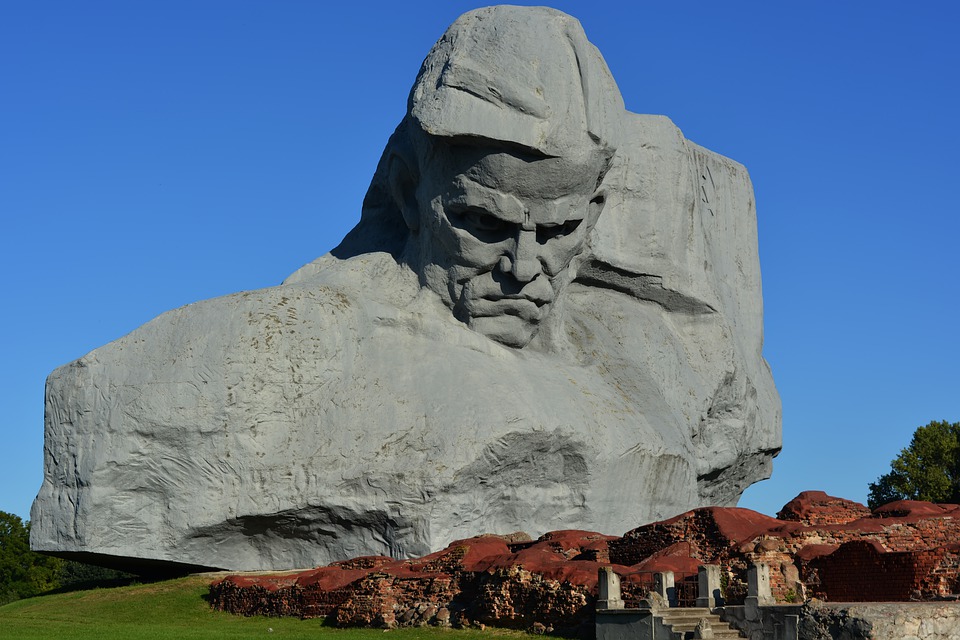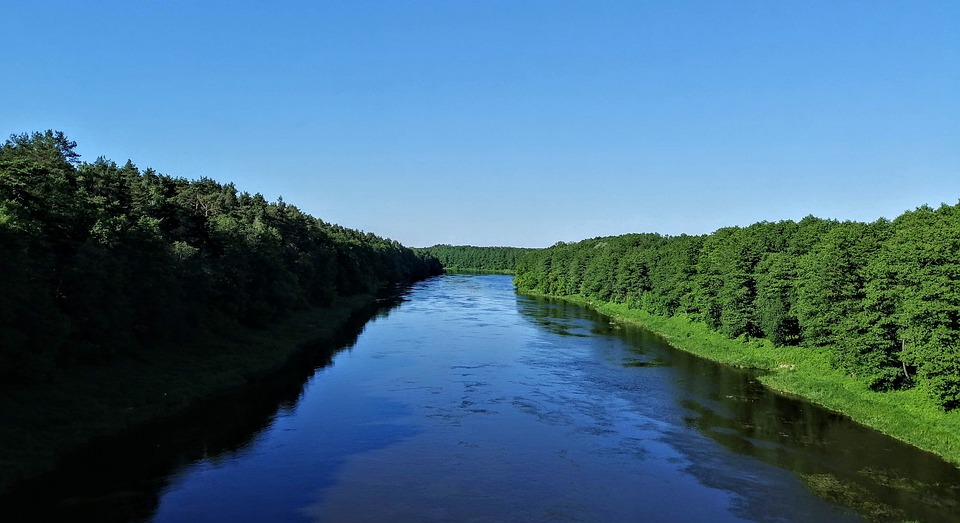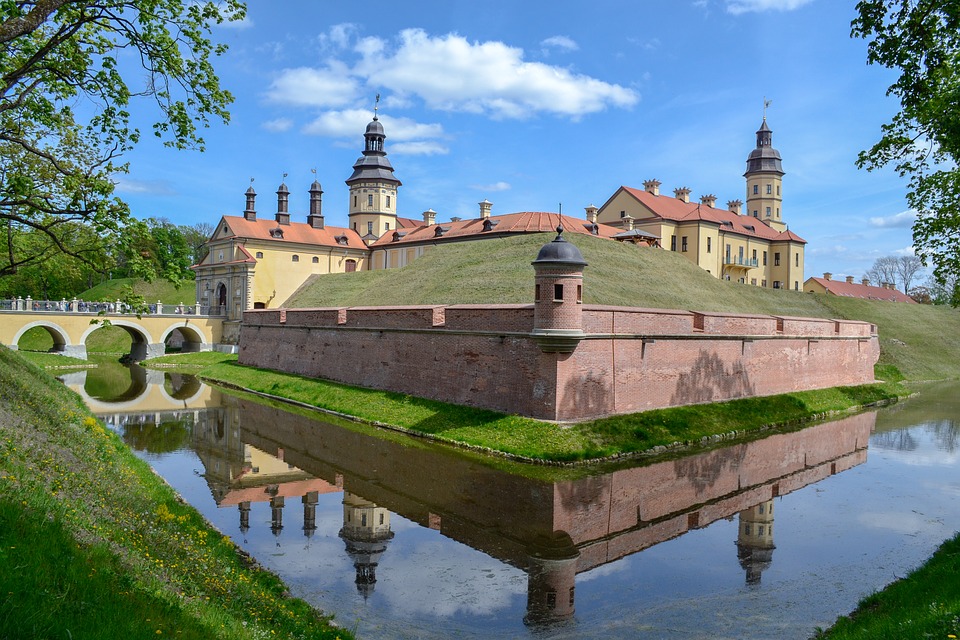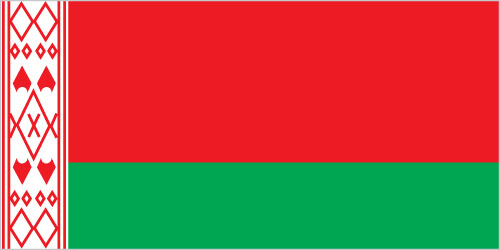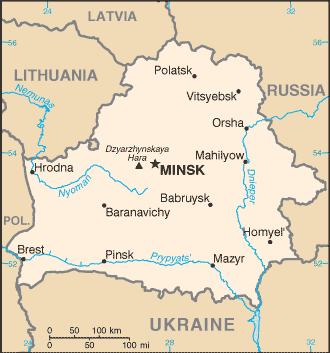Overview
| Conventional Long Form: | Republic of Belarus |
| Local Long Form: | Respublika Byelarus'/Respublika Belarus' |
| Local Short Form: | Byelarus'/Belarus' |
| Population: | 9,527,543 (2018 est.) |
| Median Age: | 40.3 years (2018 est.) |
| GDP per Capita: | $18,900 (2017 est.) |
| Gross national saving: | 24.5% of GDP (2017 est.) |
| Suffrage: | 18 years old; universal |
| Legal Drinking Age: | 18 years old |
| Road Driving Side: | Right hand side of the road |
Holidays and Observances
Business Practices
Punctuality, Appointments, and Local Time
- Belarusians believe that punctuality is a hallmark of foreign business practices. Your image as a business professional depends upon your punctuality.
- Don’t be surprised if high-level Belarusians are late. Punctuality is your tradition, not theirs.
- Residents of Belarus write the day first, then the month, then the year (e.g., December 3, 2010, is written 3.12.10 or 3/12/10).
- Before your first meeting, the company’s top executive should know who you are, what you are interested in, what your project is, and (most importantly) which other Belarusian bureaucrats have agreed to it or are supportive.
- This data is usually transmitted most effectively through your hired intermediary. Your contact can be a medium-level executive, but he or she should be respected and known by top management.
- At the first meeting, Belarusian managers will appreciate a written, straightforward outline of the project under discussion. Your intermediary should be prepared to expand on details when necessary.
- The intermediary should not only promote your project but follow up as well. A good intermediary verifies that e-mails and faxes are properly prepared, translated, transmitted, and received. Equipment and delivery can be frustratingly inefficient.
- Further meetings should be planned immediately and the dates fixed; the names of people to be involved (plus their contact information) should also be determined. If this meeting is to be a month later, send follow-up messages with copies to your intermediary.
- Belarus is two hours ahead of Greenwich Mean Time (G.M.T. + 2). This makes Belarus seven hours ahead of U.S. Eastern Standard Time (E.S.T. + 7).
- Belarus undergoes a form of daylight-saving time, with the switch usually occurring around the end of March and October. The exact dates of time changes are announced from year to year and generally differ from the schedule used in Western Europe.
Negotiating
- Traditionally, bureaucrats tended to answer “no” to a proposal if they had nothing to gain by agreeing. Indeed, the ability to say “no” was historically their only real power.
- More recently, the higher the executive level, the easier it seems to be able to get a “yes.” But this does not guarantee an affirmative on lower levels. Remember that Belarus isolated itself from capitalism, so some routine Western business practices may be unfamiliar. Be prepared to explain every aspect of a deal.
- Getting a positive response at every bureaucratic level requires solid groundwork and help from an intermediary.
- At this time there is a dearth of experts in Belarus’ ever-changing business and legal regulations. Belarus executives themselves may not have a full grasp of the legal issues. Hire a local lawyer who is an expert in Belarusian law to monitor the entire business environment and report to you independently.
- Belarusian negotiators may walk out of the talks at some juncture. While this tactic is becoming less common, and can alarm westerners, a deal might not be considered well made if its discussion and details went completely smoothly.
- Your Belarusian partners are expecting concessions, so go to the talks with a private list, made in advance, of items on which you are prepared to bargain. Concede one item at a time, so that your partners feel that such benefits are a result of their efforts. Once a deal is final, Belarusians usually consider renegotiation impossible.
- At the appropriate time, make certain that all sides completely understand any legal regulations from your home country that are involved in the deal.
Business Entertaining
- Breakfast is usually between 7:00 and 8:30 a.m. Business breakfasts are not common.
- Belarusians like to invite business partners to restaurants or to their homes. They have a strong tradition of hospitality that was strictly restrained during the Communist years, when every foreigner was considered a spy.
- The people of Belarus have a reputation as being more pleasant than Russians. Visitors report that, when drinking, Belarusians may sing.
- Accept all invitations. Be aware that the food will be rich and the drinks strong. In fact, Belarusians feel that business arrangements go more smoothly when their business partner is more relaxed through convivial drinking. Belarusian men are proudly confident of their own drinking ability, and a man may drink half a liter of vodka in an evening without any obvious effect.
- It is gracious to learn a few toasts. The most common are na zdo ro vie (your health) and an ancient Polish toast, sto-lyat (a hundred years).
- When hosting a meeting, be certain to use china, not plastic, for serving refreshments. Belarusians usually supply a variety of refreshments when conducting meetings and appreciate reciprocity. Also, have a supply of cigarettes, lighters, calculators, and so forth.
- Traditional Belarusian restaurants have tables designed for four or six people. If your party has only two or three, you may be asked to share a table with strangers when you are seated.
- Once you open one, you must pay for an entire bottle; no matter how little of it you drink. Many restaurants and cafés accept only hard currency.
- Bottles are often left on the tables, along with as much food as the guests can possibly consume, because it is traditional to present an atmosphere of comfortable abundance. Choices of sodas, wines, cocktails, brandy, and “the best Belarus vodka in the world” will be served.
- Dinner invitations at a home are usually for Saturdays at six, but guests take up to an hour to gather. In a home, you will probably find that the children are included.
- Good topics of conversation include the cultural and artistic achievements of Belarus, sightseeing, and (especially) sports. For a small country, Belarus has produced more than its share of Olympic winners.
- Bad topics of conversation include anything that might meet with disapproval from the government of Belarus, such as allegations of corruption, money-laundering, or human rights violations.
- Remember that it is usually to your advantage to look and sound like a foreigner because foreigners get preferential treatment and help almost everywhere. (However, this can also make you more of a target for street crime since you presumably have more valuables.)
Business Tips
- While many Russians will assure you that reunification between Russia and Belarus is only a matter of time, you should take Belarusian nationalism seriously. Many Belarusians consider themselves ethnically separate from Russians and believe they are fully entitled to a separate state. Stating a different opinion may invite a lecture on the complex, interlocking history of Ruthenians, Poles, Lithuanians, Ukrainians, and Russians.
- On the other hand, there are many citizens of Belarus who would welcome reunification with Russia. These are not limited to ethnic Russians.
- Western governments have accused Belarus of all manner of crimes, from money-laundering to weapons trafficking with Iran to human rights violations. Of interest to foreign business people is Belarus’ habit of confiscating entire shipments and the vehicles they came in on if there is the slightest irregularity.
- Despite the drawbacks, there are viable business opportunities in Belarus. The country reminds some international businesspeople of Russia in the dynamic years after the collapse of the USSR.
- Belarus is almost completely dependent upon Russia for its supplies of petroleum and natural gas. Consequently, events in Russia can have a major effect upon Belarus and its economy.
Protocol
Greetings
- Belarusians are not demonstrative in public. Only relatives, very good friends, or well-known business associates of long standing are greeted cheerfully with an embrace and a kiss on each cheek.
- Except at formal or state affairs, Belarusians usually shake hands and state their own last name to a stranger instead of using a phrase like “How do you do?” Respond in the same way.
- Men and women readily shake hands with each other.
Titles/Forms of Address
- Belarusian names are written in the same order as in the West. The middle name is a patronymic (a name derived from the father’s first name). In the example of “Svyatoslav Alesevich Bryl,” Svyatoslav is the first name, the patronymic means “son of Ales,” and the surname is Bryl.
- Women often add an a to their surname.
- Be careful not to confuse the order of names. It is now acceptable to use only the last name for a person of slight acquaintance; for example, Bryl, Gospodin Bryl (the polite method), or even Mr. Bryl is appropriate. His wife would be Gospozha Bryl or Mrs. Bryl.
- The only title of respect traditionally used in Belarus is “Professor.” It is used when addressing a doctor of science, an elderly scientist, or a schoolteacher beyond the elementary level.
- There are few variations of first names and surnames. Some are so often used (e.g., Vasil, Vasilievich, and Vasiliev) that confusion is inevitable. Furthermore, if you are invited to address a person by his or her first name, remember that all first names have diminutives, nicknames, and pet names. Which you will use depends on the depth of your acquaintance. The best advice is to ask; he or she will be happy to explain.
Gestures
- Belarusians have their share of obscene gestures. The North American “okay” sign (thumb and forefinger touching in a circle) and any shaken-fist gestures are interpreted as vulgar.
- It is impolite to sit with your legs spread apart or with your feet propped up on a table.
- The thumb between the forefinger and middle finger means “you’ll get nothing.”
- Whistling is not a sign of approval at a concert or sporting event; instead, it indicates strong disapproval.
- Whistling inside a building is also inappropriate because of a superstition that it will cause one to lose money.
- Sitting a minute before leaving home brings good luck, as does knocking three times on wood.
- “Thumbs-up” means “good” or “okay,” as it does in North America.
- Nyekulturny is a Russian word that is used the same way in Belarus. It means that something is “just not done,” or is ill-mannered. Some nyekulturny behaviors include: wearing an overcoat in a public building, concert hall, or restaurant, and particularly the theater [Leave your coat in the garderob (cloakroom)—many office buildings have them too]; sitting on your coat at a concert or restaurant (but it is acceptable at the cinema); standing with your hands in your pockets, raising your voice, or laughing loudly in public buildings, subways, or on the street.
Gifts
- Belarusians appreciate small gifts—pens, business card holders, rock or country–and–western CDs, illustrated books, fine bars of soap, American cigarettes, solar calculators, gold or silver jewelry, or electronic gadgets.
- Note that some visitors may give expensive, prestigious watches, pens, lighters, and so forth. You are not expected to compete in gift giving.
- Flowers are always proper to give to a hostess.
- Exotic food, especially seafood, can be a good gift, but avoid caviar, salmon, sturgeon, and shrimp, all of which are abundant in the area.
Dress
- Belarusians dress conservatively for the office. Even businesspeople who are familiar with current Western styles rarely wear clothes that draw notice.
- Some buildings may not be well heated in winter, so a layered dress style will be more comfortable.
- Dress for a dinner invitation can be anything from black tie to blue jeans. Hosts may offer slippers, but guests sometimes bring extra footwear, especially in winter, when overshoes are often left at the door.
Background
History
Belarus experienced it first modern independence in 1917 and 1918, after the collapse of Czarist Russia and the Brest-Litovsk Treaty, which divided up the Russian Empire. This Belarusian Peoples Republic was short-lived; it was soon absorbed into the new USSR.
Between the wars, Belarus and neighboring Ukraine suffered famine due to purges and the forced collectivization policies of Stalin. Millions of people died, and thousands more were deported to Siberia.
Belarus was occupied by Nazi Germany from 1941 to 1944. Thousands of Jews were executed and deported to concentration camps. As they did in other occupied areas of the USSR, the Nazis raised local troops to fight Moscow.
In 1986, the Chernobyl nuclear accident in neighboring Ukraine spewed radioactive fallout over much of Belarus.
Belarus declared its independence from the USSR on July 27, 1991. It established itself as a parliamentary republic within the Commonwealth of Independent States (CIS).
In 1994, Alexander Lukashenko was elected the first president of Belarus. Thanks to a constitutional referendum in 1996, he extended his presidential term and concentrated almost all government power in the executive branch.
Belarus signed the Belarus-Russian Union Treaty on April 2, 1997. This provided close coordination of military and economic policies between the two countries. Eventual union of the two nations is considered likely, but no date for that has been set.
By 2004, President Lukashenko had been in office for ten years, but he wanted to remain in power despite term limits. He responded angrily to various sanctions against his government. These included the Belarus Democracy Act of 2004 of the United States, an EU travel ban on four top Belarus Ministers, and Greece’s refusal to allow the Belarus minister of sport to attend the 2004 Summer Olympic Games in Athens.
Government
The Republic of Belarus is a parliamentary republic. However, since his election in 1994, all power has gravitated to Alexander Lukashenko. Sometimes called “the last European dictator,” President Lukashenko has ruled Belarus while maintaining a semblance of democracy. Lukashenko’s “market socialism” has effectively isolated his country from Western capitalism and trade. Most of Belarus’ trade is with Russia and Ukraine.
Belarus was one of three founding members of the Commonwealth of Independent States, a successor organization to the USSR.
For current government data, visit the Embassy of Belarus, which has a Web site
at http://usa.mfa.gov.by/en/embassy/address/.
Principal Government Officials of Belarus as of July 2025:
(from https://www.cia.gov/resources/world-leaders/foreign-governments/belarus/)
| Designation | Name |
| Pres. | Alyaksandr LUKASHENKA |
| Prime Min. | Alyaksandr TURCHYN |
| First Dep. Prime Min. | Mikalay SNAPKOW |
| Dep. Prime Min. | Yury SHULEYKA |
| Dep. Prime Min. | Viktar KARANKEVICH |
| Dep. Prime Min. | Anatol SIVAK |
| Dep. Prime Min. | Natallya PYATKEVICH |
| Min. of Agriculture & Food | Yury HORLAW |
| Min. of Antimonopoly Regulation & Trade | Artur KARPOVICH |
| Min. of Architecture & Construction | Alyaksandr STUDNEW |
| Min. of Communications & Informatization | Kiryl ZALESKI |
| Min. of Culture | Ruslan CHERNETSKY |
| Min. of Defense | Viktar KHRENIN |
| Min. of Economy | Yury CHEBOTAR |
| Min. of Education | Andrey IVANETS |
| Min. of Emergency Situations | Vadym SINYAWSKI |
| Min. of Energy | Dzyanis MAROZ |
| Min. of Finance | Yuryy SELIVERSTAW |
| Min. of Foreign Affairs | Maksim RYZHENKOW |
| Min. of Forestry | Alyaksandr KULIK |
| Min. of Health | Alyaksandr KHADZHAYEW |
| Min. of Housing & Communal Services | Henadz TRUBILA |
| Min. of Industry | Andrey KUZNYATSOW |
| Min. of Information | Marat MARKAW |
| Min. of Internal Affairs | Ivan KUBRAKOW |
| Min. of Justice | Yawheny KAVALENKA |
| Min. of Labor & Social Protection | Natallya PAVLYUCHENKA |
| Min. of Natural Resources & Environmental Protection | Syarhey MASLYAK |
| Min. of Sports & Tourism | Syarhey KAVALCHUK |
| Min. of Taxes and Duties | Dzimitryy KIYKA |
| Min. of Transport & Communication | Alyaksey LYAKHNOVICH |
| Chief, Presidential Admin. | Dzmitryy KRUTOY |
| Chmn., Ctte. for State Security (BKGB) | Ivan TERTEL |
| Chmn., National Bank | Raman HALOWCHENKA |
| Chmn., State Border Ctte. | Kanstantsin MOLASTAW |
| Prosecutor Gen. | Andrey SHVED |
| Permanent Representative to the UN, New York | Valyantsin RYBAKOW |
Language
The official language of Belarus is Belarusian, which is understood by some 98 percent of the population. Belarusian is written in Cyrillic script. It is a Slavic language, midway between Russian and Ukrainian. Most dialects of Belarusian are more or less intelligible to speakers of both Russian and Ukrainian.
Because of the dominance of Russia in education and the media, most citizens of Belarus can also speak Russian. In fact, many ethnic Belarusians use Russian in everyday life.
Also spoken in Belarus are Polish, Ukrainian, Yiddish, Tatar, Lithuanian, Latvian, and Roma (Gypsy).
For more information on the various languages of Belarus, see Ethnologue at www.ethnologue.com.
Views
There is no official religion in Belarus, but at least 60 percent of the population identify themselves as Orthodox. (Some reports indicate as high as 80 percent Orthodox.) Formerly this was the Russian Orthodox Church, but in 1990 Belarus was designated an exarchate.
Religion was discouraged under Communism, so church attendance has experienced a substantial revival since independence. Nineteen different religious denominations have been officially registered.
As with other institutions, churches have historically been under the control of outsiders in Belarus. Some three-quarters of Belarusians once belonged to the Uniate Church, which is a Greek rite church that accepts the authority of the Roman Catholic pope. Moscow outlawed the Uniate Church in 1839, replacing it with the Orthodox faith. More recently, Moscow suppressed the Roman Catholic
Church, especially when John Paul II of Poland became pope. Recently, various Protestant groups have experienced rapid growth.
Belarus is considered the slowest ethnically Slav republic to make adjustments to capitalism. Belarusians generally do not feel in control of their own destiny. They have lived under authoritarian governments their entire lives. Also, the radioactive fallout from the Chernobyl accident in neighboring Ukraine has contaminated much of Belarus, causing increased rates of thyroid cancer—another factor over which they have no control.
While many older citizens of Belarus feel nostalgia for the USSR and would welcome reunion with Russia, these feelings are not necessarily shared by the young, who have grown up in an independent Belarus.
The best and brightest of Belarus have often left their homeland. During the days of the USSR, many left for more prestigious positions in Moscow. Today, some also seek success in the West.
Cultural Orientation
Cognitive Styles: How Belarusians Organize and Process Information
Belarusians have a great desire for independence and autonomy, but they are steeped in tradition and tend to follow powerful leaders without question. Most education is skill-oriented; it is practical rather than conceptual. Belarusians’ concerns are generally for the immediate, particular situation.
Negotiating Strategies: What Belarusians Accept as Evidence
Truth is found in the pressing, real-time feelings of the participant. It is often enhanced by faith in an ideology or a strong leader, but not generally by the accumulation of objective facts.
Value Systems: The Basis for Behavior
Although the name of this country means “White Russia,” Belarusians are more similar to Ukrainians in their values than they are to Russians. The following three sections identify the Value Systems in the predominant culture—their methods of dividing right from wrong, good from evil, and so forth.
- Locus of Decision-Making: There is a continual struggle between individual freedom and obligations to the collective unit. Traditionally the extended family is the basic unit for decision- making, but this unit includes persons other than blood kin who are accepted into the family. Although all members have a strong need to contribute to the welfare of the collective unit, the head of the family or the family unit makes decisions. In general, Belarusians value stability over freedom, and are willing to cede decision-making to a strong leader as long as he keeps the peace.
- Sources of Anxiety Reduction: Because Belarus has historically been dominated by Poland, Lithuania, and Russia, there is considerable national ambiguity stemming from the controversies over its name, language, traditions, and national heritage. Loyalty to an employer or local leader
provides a sense of security. This makes the extended family or collective unit essential in avoiding uncertainty.Religion has experienced a revival since 1990 and helps provide structure and reassurance into the lives of its adherents. However, even here there is uncertainty, with some smaller religions (such as the Uniates, the Old Believers, and some Protestant sects) claiming that they are the true nationalist Church of Belarus, while the two majority religions (Orthodoxy and Roman Catholicism) are controlled by non-Belarusians. - Issues of Equality/Inequality: There is a strong desire for autonomy, individual freedom, and private property, but both tradition and Communism have taught Belarusians to accept and respect collectivism. Power is vested in the leader, and he or she is responsible for the behavior of subordinates. (For example, disobedience among children is considered the fault of the parents.) Men and women have strict sex roles that are not to be confused, but each has an autonomy that is respected by the other. There is a strong sense of equality between husbands and wives, even though men do not usually share the household chores.
- Cultural Notes
This nation has been known in the West under several different names: White Russia, Byelorussia, Belorussia, and others. Historians sometimes use the term “Ruthenia,” although the Ruthenians are both Belarusians and Ukrainians. Its current official name is the Republic of Belarus. There is still dispute on the spelling of the adjectival form in English. Both Belarusan (without the i) and Belarusian (with the i) are currently in use. Some even use Belarussian (two s’s and an i, as in Russian). - Belarus has a variety of instruments for folk music, which includes familiar items like the mandolin (mandalina) and button accordion (harmonik) and the hammer dulcimer (cymbaly). They also have more unusual instruments, such as the double pipes (parnyia dudki); a musician playing the double
pipes looks as if he has stuck two wooden pipes of different length in his mouth at the same time. Another odd-looking instrument is the Belarus bagpipe (duda), which sports three different pipes. - Astonishingly, in October of 2004, President Lukashenko opened a monument outside Minsk commemorating the birthplace of Felix Dzerzhinksy (Feliks Dzerzhinskii) (1877–1926). Dzerzhinsky was the founder of the Soviet secret police known as the Cheka, and was the long-time head of the Soviet terror campaign, which caused the torture and execution of thousands! After the collapse of the USSR, Dzerzhinsky’s statue outside Moscow’s KGB headquarters was torn down, but Lukashenko seems intent on rehabilitating his memory.
- The Belarusian language has not always been written in Cyrillic script. The Muslim Tatars who immigrated to Belarus once wrote Belarusian in Arabic script. Their books, called kitabs, date back to the fourteenth century. Today, surviving kitabs are prized artifacts, as well as important subjects
for linguistic study. - Now that government repression of religion has abated, old conflicts between the faiths have re-emerged. Some citizens of Belarus see the Roman Catholic Church and the recently revived Uniate Church (a.k.a., the Greek Orthodox Catholic Church) as agents of a foreign power—that is, the
Vatican. Because some churches now occupied by the Belarus Orthodox Church were once owned by the Catholics and Uniates, there are issues over disputed property as well. - The people of Belarus have a tradition of creating simple, low-tech devices to help them survive. One such is the shmyhala, a small windmill-like device that creates underground thumps that frighten away moles. Similar folk technology is on display at the museum at Dudutki, outside Minsk.
- When written in a foreign alphabet, there may be many ways to write a Belarusian name. For example, in English, the president’s surname is alternately written as Lukashenko or Lukashenka. His first name may be Anglicized into Alexander, or the more traditional Alyaksander or even
Alyaksandr. Since there is no rule to follow, ask your Belarusian associate how he or she would like the name to be transcribed into your language. - Don’t forget the effects of the Chernobyl nuclear accident. At least one-quarter of the topsoil in Belarus was contaminated by radioactive fallout, and this is easily transferred onto shoes. If you have reason to walk around in the Belarusian countryside, you might consider disposing of those shoes when you leave Belarus. At the very least, wash them off—otherwise you might risk setting off radiation detectors when you go through an airport security checkpoint.
Safety Tips
- Reciprocity, a common tactic in the Cold War, is alive and well in Belarus. If your nation does something that displeases the leaders of Belarus, you may be caught up in the dispute. For example, if your nation refuses entry to an important citizen of Belarus, you may be refused entry into Belarus—even though you had nothing to do with your government’s actions.
- As in other former republics of the USSR, street crime is present. Corruption is rife; the police are always willing to demand a few dollars from foreigners for some imaginary infraction.
- Although the location of Belarus in Eastern Europe should make it an important transit point for trade, many of its roads remain in poor condition.
- Street demonstrations against the government occur at times, especially in the capital of Minsk. Foreigners should avoid such demonstrations, which risk the possibility of arrest.
- Despite recent claims by the Belarusian minister of health that their health-care system “is now reaching the world level in terms of using modern equipment and technologies,” the U.S. State Department recommends that foreigners who experience medical emergencies in Belarus opt for
medical evacuation and seek treatment elsewhere. - Although the 1986 Chernobyl nuclear accident occurred in Ukraine, the prevailing winds blew much of the fallout into neighboring Belarus. The cleanup of this fallout has been haphazard; vast stretches of southern Belarus remain contaminated. There is also soil pollution from heavy
pesticide use.
Test Your Knowledge
Questions
- State whether the following statement is True or False. When the United Nations was formed, the Byelorussian Soviet Socialist Republic had a vote in the UN, separate from that of Russia.
- True
- False
- State whether the following statement is True or False. The Pahonia - a symbol featuring an armored knight astride a charging horse - is now the national symbol of the Republic of Belarus.
- True
- False
- The Radzivil family was the most famous and accomplished house of Belarusian nobles.
Who among the following established first secular Slavic theater?- Mikalaj Radzivil Corny (1515–1565)
- Mikalaj Radzivil Sirotka (1549–1616)
- Franciska Ursula Radzivil (1705–1753)
Answers
- True
The price for the USSR to join the United Nations was that they received three votes in the general assembly, not just one. Russia, Ukraine, and Byelorussia all had a vote. Of course, all three voted the same way. - False
The Pahonia (which can be translated as "the chase") was often used as the national symbol of Belarus, including immediately after the collapse of the USSR in 1991. However, it was banned as an official symbol in 1995 because it is also associated with the Nazi-occupied state of Belarus during the Second World War. - Franciska Ursula Radzivil (1705–1753)
Franciska Ursula Radzivil (1705–1753) established first secular Slavic theater. Mikalaj Radzivil Corny (1515–1565) was the Governor of Vilnius. Mikalaj Radzivil Sirotka (1549–1616) fought Calvinism and wrote travelogues.

